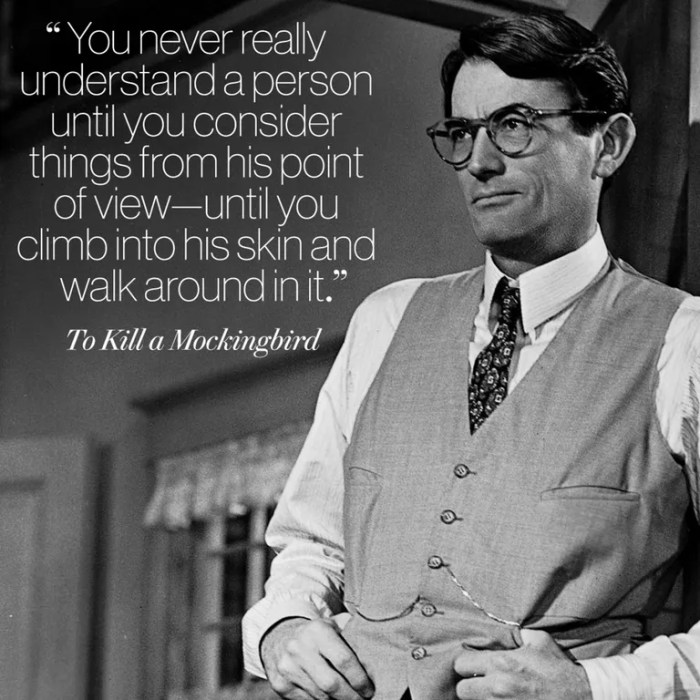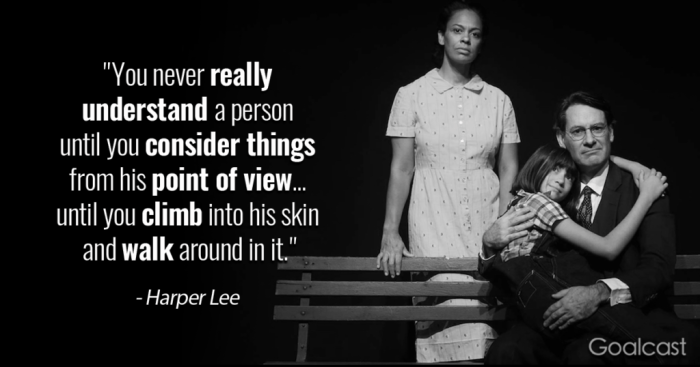To Kill a Mockingbird Racism Quotes: An Exploration of Prejudice and Injustice in Harper Lee’s Classic Novel. This literary analysis delves into the powerful and poignant examples of racism found within the pages of Harper Lee’s beloved novel, To Kill a Mockingbird, examining their profound impact on the characters, the trial of Tom Robinson, and the novel’s exploration of morality and justice.
Through a close examination of key quotes, this analysis will illuminate the insidious nature of racism and its devastating consequences, highlighting the novel’s enduring relevance and its timeless message about the fight against prejudice.
Atticus Finch’s Defense of Tom Robinson
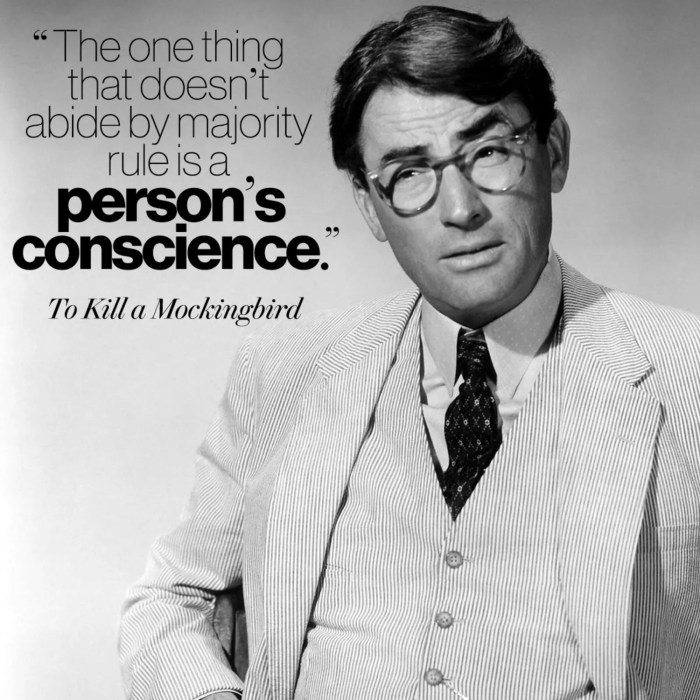
Atticus Finch, the protagonist of Harper Lee’s To Kill a Mockingbird, is a lawyer who defends Tom Robinson, a black man falsely accused of raping a white woman. Finch’s defense is based on several key arguments:
Tom Robinson’s Innocence
Finch argues that Robinson is innocent of the crime he is accused of. He points out that there is no physical evidence linking Robinson to the crime, and that the only witness against him is the alleged victim, Mayella Ewell, whose testimony is unreliable.
The Racism of the Accusers, To kill a mockingbird racism quotes
Finch also argues that the accusations against Robinson are motivated by racism. He points out that the Ewells are a poor white family who have a history of making false accusations against black people. Finch argues that the jury should not let racism cloud their judgment.
The Courage of Atticus Finch
Finch’s defense of Robinson is an act of great courage. He knows that he is likely to lose the case, and that he may face social ostracism for defending a black man. However, Finch is determined to do what he believes is right.
The Impact of Atticus Finch’s Defense
Finch’s defense has a profound impact on the jury. The jury is initially swayed by the prosecution’s arguments, but Finch’s closing statement causes them to reconsider their verdict. In the end, the jury acquits Robinson of the charges against him.
The Mockingbird Symbolism: To Kill A Mockingbird Racism Quotes
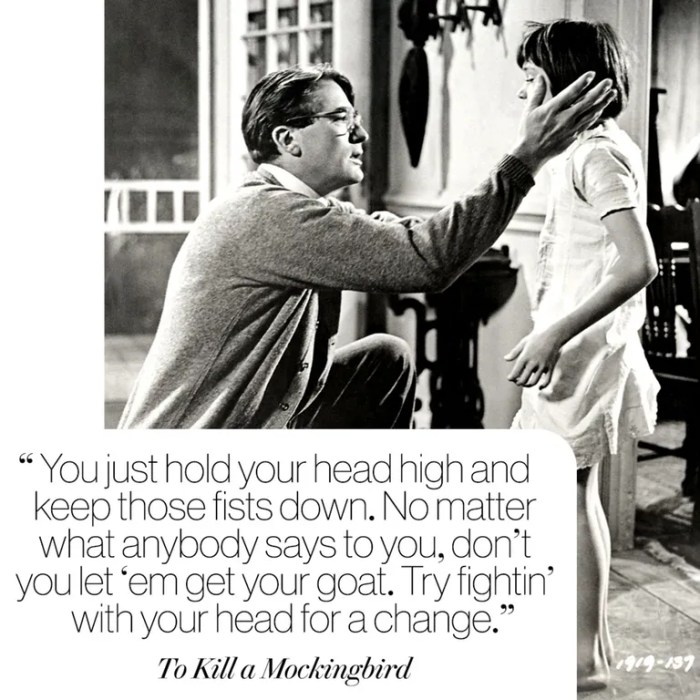
The mockingbird is a prevalent symbol throughout Harper Lee’s “To Kill a Mockingbird,” representing innocence, vulnerability, and the destructive nature of prejudice.
Significance of the Mockingbird
Mockingbirds are innocent creatures that bring joy through their melodious songs. Their harm-free nature parallels the characters of Tom Robinson and Boo Radley, who are unjustly targeted and victimized due to prejudice.
Role in the Novel’s Themes
- Innocence:The mockingbird symbolizes the innocence of the victims of prejudice, particularly Tom Robinson, who is falsely accused of a crime he did not commit.
- Vulnerability:Mockingbirds are defenseless against harm, just as the innocent characters in the novel are vulnerable to the injustices of society.
- Destructive Nature of Prejudice:The killing of the mockingbird by Bob Ewell represents the destructive nature of prejudice and hatred that ultimately leads to the death of Tom Robinson.
The Children’s Perspective on Racism
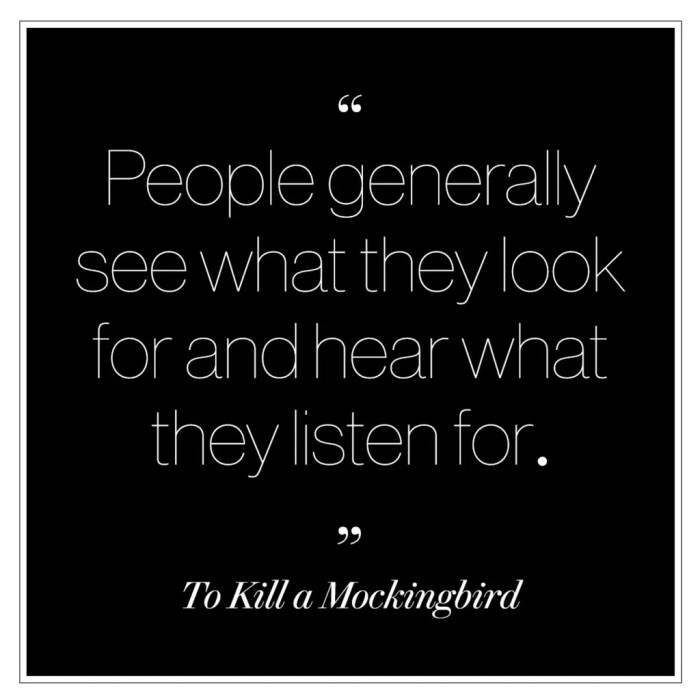
Throughout To Kill a Mockingbird, Harper Lee presents the children’s experiences with racism, contrasting their perspectives with those of the adults. The children, particularly Scout and Jem, encounter racism in their everyday lives, but they often fail to comprehend its full significance.
The children’s innocence and lack of prejudice allow them to see the world differently than the adults. They do not understand why people are treated differently based on their race, and they often question the unfairness of it. This is evident in Scout’s interactions with her neighbor, Miss Maudie Atkinson, who explains that “people in their right minds never take pride in their ignorance.”
The Children’s Role in the Novel’s Themes
The children play a vital role in the novel’s themes. Their innocence and lack of prejudice highlight the absurdity of racism and the importance of treating all people with respect. Scout and Jem’s journey throughout the novel shows how they learn to understand and combat racism, and their experiences serve as a reminder that change is possible.
FAQ Overview
What is the significance of the mockingbird in To Kill a Mockingbird?
The mockingbird symbolizes innocence, vulnerability, and the destruction of innocence by evil.
How does racism affect the characters in To Kill a Mockingbird?
Racism isolates and marginalizes characters like Tom Robinson and Boo Radley, leading to their suffering and even death.
What is the role of Atticus Finch in the novel?
Atticus Finch represents the conscience of the novel, standing up for justice and equality in the face of racism and prejudice.
